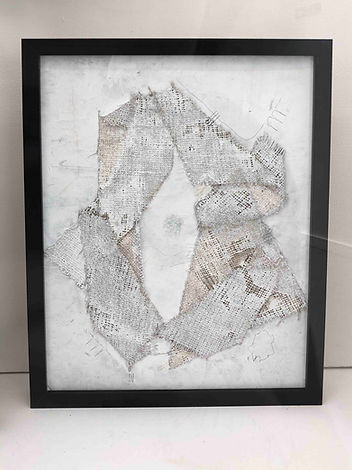
Body Chronicles
This ongoing artistic research project looks into the intersections between art and
health and focuses on the universal, yet specific lived experiences of being-in-the-world.
States of complex discomfort such as chronic pain and health conditions have the potential to challenge our concepts of what a body is, and how we strive to define, feel or not feel and navigate it. Often unseen in our societies, many people are having to integrate their ongoing complex state of discomfort into a system of health care, work and personal as well as societal politics that demands them to be diagnosed, to get better and to function efficiently nevertheless. Chronic states thus rupture the ideal of constant (economic) progress – but they also invite for an examination of what being whole means for each of us as. If it is true what dance practitioner Miranda Tufnell said, that “we cannot do it alone, we need others to heal” – what does that mean for our concepts of healing?
And, what does it mean to sick or healthy?
Which is the norm and which the deviation?
How do mind and body relate, and what counts as internal and external causalities?
And how to create a soft space to be with those experiences and questions?
This project fans out into multiple formats and perspectives, taking into account somatic practice, artistic work, crip art as well as conversations and collaborations. The aim is to develop a personal tool box for research, a set of resources and artistic explorations.
This is a tool box with exercises and key questions that guide
my research and artistic practice:
Can breath be a flow of attention that devides large intangible areas into smaller tangible parts, and that integrates parts into a whole?
How this translate into movement / thinking / writing / drawing?
Can you pay attention to the micro movement that make up a larger movement?
Which tone of muscles relates to care?
How does your current sensation or creative practice relate to these words?
everyday
always
now
in the future
yesterday
Can rest become a state of curiosity towards what is needed or desired?
resting into the backspace?
What is an organic shape? What is alignement?

Documentation photos of performative encounters at Turf Project Space in Croydon, London, 2023 © Mira Hirtz
Artist Fransizka Boehm and I were able to share our practices in a set of participatory conversations. I invited paritipants to compose shapes on a table and a wall according to questions regarding the sensation of their bodies, the city they live in and many more. I was curious to explore composing as a tool for feeling into topics without needing to express them in words.


Small Plane, 2023 © Mira Hirtz
n.T., photo transfer and drawing on unprimed canvas, 2023 © Mira Hirtz

Clear and not so clear, illegible writing in notebook, 2023
© Mira Hirtz
Tool box
Artistic explorations


Resources
(All links open in new taps)
Artistic and curatorial projects:
In Transit is a non-profit contemporary arts platform dedicated to facilitating artistic exchange and increasing access to the arts. Process and education lie at the heart of their ethos as they strive to normalise the integration of access in artistic development.
They offer online programmes and create opportunities for artists to experiment with new ideas, reflect on what they do, and develop accessible, thought-provoking work and research.
Raquel is a UK based dance theatre practitioner. She founded Unchartered Collective in 2016 to create theatrical encounters that explore the lived experience of invisible disability. She identifies as dis-abled, works with rest and horizontality as creative impulses, and acknowledges 'crip' as a tool in her artistic process. She is interested in interrogating theatrical form, to tell stories about the lived experience of disability in unusual ways.
Envisioned as an experimental platform that collects and features diverse practices of care performed by people from all walks of life, Care Index currently manifests as live and digital workshops, installations and moving image. This has been initiated by artist Alecia Neo.
This is an organisation led by disabled people, set up to advance disability arts and culture through the pages of their journal. Their raison d’être is to support disabled artists, as much as anything by getting the word out about the art being produced by artists within the sector.
Accessibility tools:
How To Make Information Accessible. A guide to producing easy read documents
Typography in Inclusive Design Part 1: 8 key tips for accessible typography
What is a relaxed performance? by Tourettes hero
Theoretical and practical inputs:
Somatic Practice and Chronic Pain Network
The Somatic Practice and Chronic Pain Network brings together researchers/practitioners from dance, health and digital design as well as people living with pain, to explore chronic pain management. In particular, it focuses on a group of dance and movement approaches called ‘somatic practices‘.
Crip Magazine is a self-published magazine project, released on an irregular basis. It draws from the history of the disability rights movement, with 80% of its contributors identifying as disabled. Drawing on the reclamation of the term crip (as in Crip Theory) that emerged within disability studies and activism in the 1970s, the magazine overturns the ableist and hyper-productive framing of bodies within capitalism. The project derived out of the motivation to create a common context.
James Thompson: "Care Aesthetics. For artful care and careful art", Routledge 2023

Collage of research on what is chronic pain, 2023 © Mira Hirtz
Source:
(link opens in new tap)